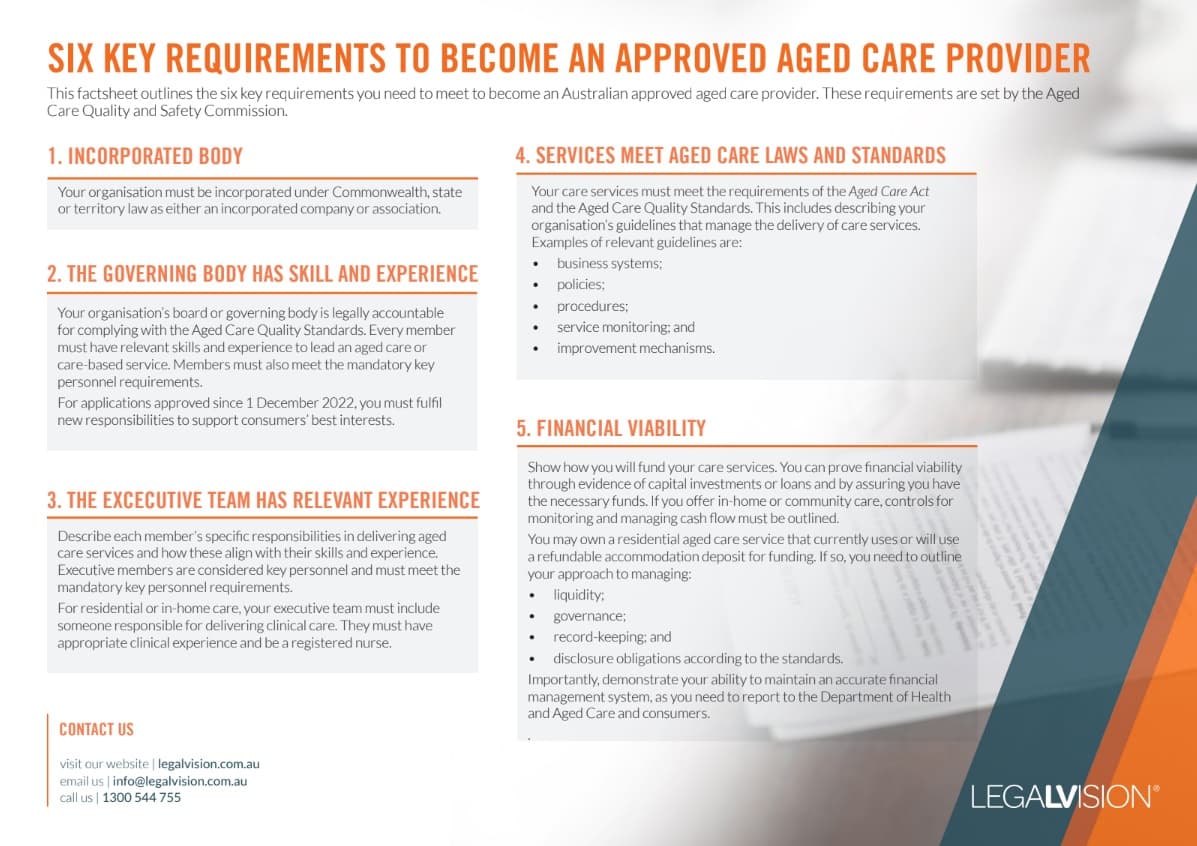In Short
- Employment contracts in healthcare should clearly outline roles, responsibilities, and obligations to avoid disputes.
- Clearly define terms related to termination, confidentiality, and intellectual property rights.
- Ensure compliance with relevant laws and regulations to protect both the employer and employee.
Tips for Businesses
Healthcare businesses must pay careful attention to drafting employment contracts, ensuring all key terms and conditions are included and compliant with industry standards and legal requirements. Regularly review and update these contracts to reflect changes in roles, responsibilities, and applicable laws. This helps in maintaining a fair and lawful working environment.
As a healthcare provider in Australia, managing your workforce effectively is crucial to delivering quality, safe patient care and successfully running your practice. As your staff are likely to build relationships with your patients, you should prioritise protecting those relationships and establishing practices to manage adverse events in the workplace, like staff misconduct. Employment contracts play a vital role in setting clear expectations and protecting both employers and employees. This article explores the key factors healthcare providers should consider when drafting and implementing employment contracts.
Employment Risks for Healthcare Providers
Healthcare providers face unique challenges when it comes to employment. Some key risks you should consider when employing and managing staff include:
- Regulatory Compliance: The healthcare industry is heavily regulated, and you must ensure your employment practices align with relevant laws and standards. This extends to ensuring your staff are appropriately trained and registered to provide healthcare services (e.g., with AHPRA) and, conversely, providing your staff with their minimum entitlements under an applicable modern award or enterprise agreement.
- Patient Safety: Staff members who are unsuitable or unclear on appropriate and expected conduct while at work pose risks to patient safety and may be engaging in professional misconduct. This could potentially lead to legal and reputational consequences for your business.
- Privacy and Confidentiality: As your staff are likely to have access to sensitive patient information, including medical information, there are risks of misuse in breach of industry codes and privacy laws.
- Staff Turnover: It is well known that the availability of critical healthcare staff is an issue faced by many private and public healthcare practices in Australia. High staff turnover or understaffing can negatively disrupt patient care and increase operational costs when you need to fill these gaps.
Do I Need Employment Contracts?
While the law does not require you to have a written employment contract with your employees, employment contracts are highly recommended for healthcare providers due to the nature of the services provided. Well-drafted employment contracts:
- operate to limit the risk of disputes with your employees;
- clarify the employee’s role, responsibilities, and performance and conduct expectations;
- ensure compliance with healthcare regulations; and
- protect your confidential information, intellectual property, and other business interests, such as patient relationships.
What Should I Include in an Employment Contract?
At a minimum, an employment contract for healthcare workers should include the following elements:
Qualifications and Fitness for Position
This clause should make continued employment conditional on the employee being qualified, trained, and appropriately registered to perform the specific healthcare services. To stay compliant as a practice owner, require employees to maintain their professional registrations (e.g., with AHPRA) and complete any continued professional development.
Job Description and Duties
This clause should clearly outline the employee’s role, responsibilities, and duties to your business. For healthcare roles, this may include specific clinical duties, patient care expectations, and any administrative tasks relevant to their service provision.
Remuneration
This clause should detail the employee’s salary or hourly rate, superannuation entitlements and any additional benefits such as professional development allowances.
You must be aware of the employee’s minimum pay entitlements. Many healthcare workers are covered by the Health Professionals and Support Services (HPSS) Award, which contains industry-specific entitlements like:
- minimum wage rates, including loadings for shift work, weekends, or public holidays;
- overtime; and
- allowances, such as on-call and uniform allowances.
Confidentiality and Intellectual Property
Each of these clauses should be included to protect your important and sensitive business information and ensure you are the owner of intellectual property developed by your employees in the course of their employment (including, without limitation, patient records).
The confidentiality clause should:
- clearly define confidential information;
- prohibit misuse and unauthorised disclosure of confidential information; and
- require that all confidential information be handed back to you or deleted by the employee on termination of employment.
Privacy
This clause should address patient confidentiality, data protection, and the handling of sensitive information in line with relevant healthcare laws and regulations.
Compliance with Policies
As a healthcare provider, you should have robust policies to govern your employees’ conduct and procedures in your workplace. While the employment agreement should not incorporate the policies, include a clause requiring employees to comply with your internal policies, such as the mandatory reporting policy and conflict of interest management policy.
Termination
This clause should detail the notice period required of either party to terminate the contract, including for serious misconduct, and set specific expectations to return property and patient records on termination.
What Happens if My Employee Breaches Their Employment Contract?
If an employee breaches their employment contract, you may have recourse under the contract or employment law. Where a breach involves a risk to patient or workplace health and safety, you should act quickly to mitigate adverse outcomes.
If an employee breaches their employment contract, you may consider:
- performance management, where the breaches involve the employee not meeting the expectations of their role;
- disciplinary action, up to and including termination if the breach involves misconduct or is so severe that the employment relationship cannot continue;
- legal action, for example, if the employee breaches their confidentiality obligations or any restraints of trade in place; and
- regulatory reporting for breaches related to professional misconduct or patient safety.
It is crucial to handle contract breaches carefully and in line with employment law. Consider seeking legal advice before taking action, especially in cases that may lead to termination or legal proceedings.

This factsheet will outline the six key requirements you need to meet to become an approved aged care provider in Australia. These requirements are set by the Aged Care Quality and Safety Commission.
Key Takeaways
Employment contracts are essential tools for healthcare providers to manage their workforce effectively and mitigate risks. By including comprehensive clauses that address the unique aspects of healthcare employment, providers can create a more secure and compliant work environment.
If you need help preparing employment contracts for your healthcare providers, our experienced employment lawyers can assist as part of our LegalVision membership. For a low monthly fee, you will have unlimited access to lawyers to answer your questions and draft and review your documents. Call us today on 1300 544 755 or visit our membership page.
Frequently Asked Questions
Healthcare providers use written employment contracts to set clear expectations, reduce disputes, and comply with industry regulations. These contracts define roles, responsibilities, confidentiality obligations, and termination terms. Without them, providers risk legal and operational issues that could disrupt patient care and business operations.
An employment contract should include clauses on qualifications, job duties, remuneration, confidentiality, intellectual property, privacy, compliance with policies, and termination. These clauses help providers manage staff effectively, protect patient relationships, and ensure regulatory compliance, creating a stable and secure work environment.
We appreciate your feedback – your submission has been successfully received.












